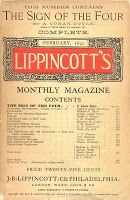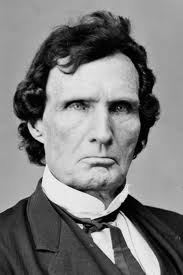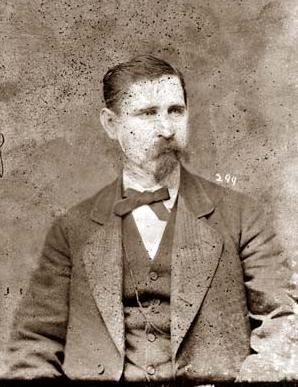“The greatest measure of the nineteenth century was passed by corruption, aided and abetted by the purest man in America.” — Thaddeus Stevens. Supposedly.
Toward the end of “Lincoln,” Thaddeus Stevens shows his African-American mistress a copy of the 13th Amendment and utters the above line. It’s a great quote. It embodies the essence of Spielberg’s film. It captures so much about politics. It frames the film’s conception of Lincoln, the quest for abolition, and Stevens’ rhetoric.
And that’s why it is too bad that he did not say it.
If you Google Thaddeus Stevens and the phrase “aided and abetted” you will get a lot of people explaining how Thaddeus Stevens said this. About 682,000 hits. That’s a lot of people repeating one another about this little bit of history. (Truth in Advertising: I did not check them all, but I am willing to bet that just about all of them attribute them to Thaddeus Stevens). But I am 93.7% sure that he did not say this.
I know that historians spend too much time ruining good stories. In graduate school I discovered that so many of the great quotes and anecdotes and stories I told when I taught high school history probably never happened. For instance, I used to mine the highly entertaining historical series by Will and Ariel Durant, The Story of Civilization, for all sorts of funky stories about ancient Rome and Greece. (The descriptions of the grotesque games the Romans set up in the Coliseum were particularly fascinating). Turns out, though, that those books are notoriously unreliable. Bummer.
And now, Thaddeus Stevens? I’m afraid so.
When I first saw the film, I figured that Spielberg or one of the writer’s had made the quote up. It didn’t fit with what I know Stevens, who had been a harsh critic of Lincoln for years. I couldn’t imagine Stevens calling Lincoln “pure” unless he said it sarcastically.
Then I did a quick internet search and discovered that Thaddeus Stevens really did say this. The internet sites referenced a couple of books by historians. Oh. OK.
But……I was still a bit suspicious because, well, I am a product of graduate school. I started digging a bit more. I knew the film took a lot from Doris Kearns Goodwin, so I checked out, Team of Rivals. I couldn’t find the quote there. I went back to the internet and found several people referencing a book entitled Thaddeus Stevens and the Fight for Negro Rights by somebody named Milton Meltzer. I was not familiar with him or the book. So I kept looking.
Then on an Amazon site I saw that Paul D. Wolfowitz had written that the quote came from someone else. What a minute. That Paul D. Wolfowitz? The deputy Defense secretary under Bush, who pushed so hard to get us into Iraq, has been spending time on Amazon critiquing books about Lincoln? Or is it just somebody else who says they were Paul D. Wolfowitz? Either way, I had trust issues here. So I had to dig some more.
I found Meltzer’s book. He wrote books for young adults, so his book did not have footnotes. Auuggh. This is why we need footnotes. I checked Allen Guelzo’s biography,  Redeemer President. He had the quote and his footnote referred to a book by Fawn Brodie. I checked David Donald’s acclaimed biography of Lincoln and he also had the quote. He referenced Fawn Brodie. (This happens: sometimes historians just quote one another if they have a clever little piece of history). So I tracked down Fawn Brodie, who wrote Thaddeus Stevens: Scourge of the South in 1959. She had the quote, which she got from an article on Thaddeus Stevens published in Lippincott’s Monthly Magazine in April, 1898. In that article James M. Scovel attributed the above quote to Stevens. Paul D. Wolfowitz, even if it was a fake Paul D. Wolfowitz, was right.
Redeemer President. He had the quote and his footnote referred to a book by Fawn Brodie. I checked David Donald’s acclaimed biography of Lincoln and he also had the quote. He referenced Fawn Brodie. (This happens: sometimes historians just quote one another if they have a clever little piece of history). So I tracked down Fawn Brodie, who wrote Thaddeus Stevens: Scourge of the South in 1959. She had the quote, which she got from an article on Thaddeus Stevens published in Lippincott’s Monthly Magazine in April, 1898. In that article James M. Scovel attributed the above quote to Stevens. Paul D. Wolfowitz, even if it was a fake Paul D. Wolfowitz, was right.
That’s it. As near as I can tell, all roads lead back to James Scovel. Stevens died in 1868, but I can’t find any other source that gets the quote any closer to him than Scovel’s 1898 recollection.
Who was James Scovel? He had been a state senator from New Jersey during the Civil
War. Lincoln appointed him to some sort of diplomatic mission to London. Later he served in various political positions and then he became a Baptist evangelist who cooperated with Dwight L. Moody. He also gave speeches about Lincoln’s religious character. It seems he had well-developed rhetorical skills. And he wrote an article about Thaddeus Stevens.
As a source, Scovel’s quote is of dubious merit. Scovel does not say where the quote came from. We don’t even know if Scovel knew Thaddeus Stevens. And even if he did hear Stevens say something like this, there is the problem of memory. How clearly and accurately are any of us able to remember something that somebody said thirty-three years earlier? Every now and then my sister and I have conflicting memories about something that happened to us thirty-three years ago, which just goes to show you how unreliable my sister’s memories are. (That’s a joke. Don’t’ tell my sister). We are on even shakier ground if we have to rely on the memory of politicians.
Actually, historians who work with oral histories know this. When memories are checked against documented evidence, a fair amount of unreliability creeps into the oral histories, especially when it comes to precise details. Cognitive psychologists know this, as well.
It’s possible that somewhere out there, some sort of documentary evidence exists to show that Thaddeus Stevens actually said this. Until that time, I’m chalking the quote up to James Scovel’s rhetorical flourishes. Sorry to spoil the party.



Oh, darn… Ruined my day!
Actually, it was a lot of fun shadowing you as you relayed your detective sleuthing!
Thanks!
David
It’s hard to imagine Stevens had a kind word to say about anyone, let alone Lincoln. The guy was a notorious curmudgeon–I mean, look at that face!
True. He showed just as much sensitivity in his bearing as he did tact in his comments.
I think that MIss Piggy summed it up best in the “Muppet’s Christmas Carol”…
Mrs. Cratchit: I suppose that on the blessed day of Christmas, one must drink to the health of, uh, Mr Stevens, even though he is odious…
Daughters: Mm-hmm.
Mrs. Cratchit: …stingy…
Daughters: Mm-hmm.
Mrs. Cratchit: …wicked…
Daughters: Mm-hmm.
Mrs. Cratchit: …and unfeeling…
Daughters: Mm-hmm.
Mrs. Cratchit …and badly dressed!
[daughters gasp]